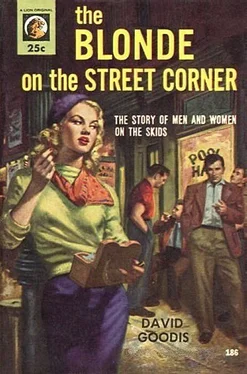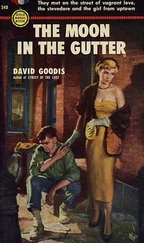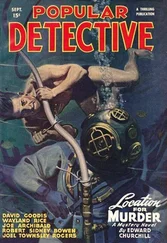Two blocks away from the candy store there was a park. It was a big park. It had a lake. The lake was a distorted circle, fringed with pavement. Placed along the pavement were benches. At times Ralph would walk to the park, dark in the thickness of late night. He would walk around the lake. He would light a cigarette. He would stand at the edge of the lake, looking at the smooth blackness sprinkled with glowing ribbons from lampposts. He would walk around the lake, moving slowly. He would walk around many times, and minutes would flick by and become an hour. The hour would double itself. He would be walking very slowly around the lake, alone.
He veered to the right and walked up to the park.
The grass and the leaves were thick black beneath the thick black sky.
He walked to the edge of the lake.
From his coat pocket he took his last cigarette, lighted it. He started to walk around the lake, very slowly.
He had fifteen cents in his pocket.
And he was telling himself not to go down there. What was he going to do after he got there? What was there, anyway? Why was it that he knew he should not go down there, and really did not want to go down there anyway, and yet had given up a pack of cigarettes so that he should have the carfare to go down there? Cigarettes were precious. He had given up a full pack. He was dragging at his final cigarette. And he had fifteen cents in his pocket. The carfare. It was not carfare yet. It would not be carfare until he slipped it through the arch in the cashier’s booth and received his token and the turnstile turned to admit him to the subway. He could still walk back to the candy store and get a pack of cigarettes and go over to Ken’s house. That was what he was going to do. He would walk once around the lake and then head back toward the corner.
Three times he walked around the lake and then he headed across the park, to the subway.
When he got off the train and walked up the steps to the street, he did not see many people, and he wondered what time it was. He asked a man, who pulled out a thick watch and told him it was a little past eleven. He stood still and told himself to go back into the subway and go home.
He walked along the dark street, away from the subway.
Then he was turning down a narrow street, moving slowly, counting the houses.
At the seventh house he stopped.
The front of the house was a door and a single window.
The window showed light coming from another room. That was all.
Ralph turned away, asking himself why he had come down here.
He was walking up the dark street. He heard a door open behind him. He heard footsteps, treading on three steps, then moving toward him. He turned around.
He saw her.
She was wearing a coat with the collar pulled up. The collar was torn, and so was the edge of a sleeve. He did not see the collar or the sleeve. He saw her face, her yellow eyes and her yellow hair.
And she moved toward him slowly, shaking her head slightly, and her eyes were sort of wide, and she was saying, “Don’t I know — you?”
“Yes. We met last Saturday — at the party.”
She nodded. “And you — went home.”
“I guess I didn’t feel well.”
“What are you doing around here?” she said.
He looked at the ground. He looked up at her and he gulped hard and then he said, “I came to see you.”
Her eyes were not wide now. But she was breathing hard, as if she had been running very fast. And she was saying, “I knew I was going to see you again.”
“You did? You knew that?”
“Yes. I thought you might do something, like this.”
“You mean you wanted me to?”
“Yes.”
He looked at the pavement. He looked at the sky. He gulped hard again and then he said, “Where were you going?”
“I came out to take a walk. I was going to see Agnes.”
“I’ll walk you up to her house.”
“No. I don’t want to see her now.”
“Because you’re with me?”
“Yes.”
They were walking slowly.
She said, “What do you do, Ralph?”
He looked at the ground. For a few moments he did not say anything. Then he muttered, “I don’t do any—” He stopped there, looked up, and said, “I’m a songwriter.”
“Oh — you are?”
“I write the words to songs. The lyrics.”
“Gosh.”
“I haven’t been doing it for long.”
“Oh, but it must be grand. Tell me about it, Ralph.”
“Well, there’s not much to it. Someone else makes up the tune and then I fit the words in. That’s all.”
“You’ve written a lot of songs?”
“No.”
“But maybe I’ve heard some of those that you have written. Do they play your songs over the radio? Do they make records of them?”
“No.”
“They print them, I guess? They give them to orchestras to play?”
“No.”
“Well then — what do they do with them?”
“Nothing.”
“Not a thing? You mean you write the songs and nothing is done with them? Why not?”
“Well, they’re not good enough.”
“Oh—”
“So I’m not really a songwriter. I don’t make anything out of it.”
“But you will someday. Your songs will get better and better and—” She looked up at him and said, “Isn’t it grand to think about? Your songs getting better all the time and then they’ll be played over the radio and the big orchestras will make records out of them and everybody will be listening.”
“I hope so.”
For a while they walked without saying anything.
Then Ralph said, “Wait here a minute.”
He ran across the street, into a candy store. It had a small, splintered glass soda fountain. An old man sat behind the fountain, reading a newspaper. He looked up. Ralph said, “Do me a favor.”
“What.”
“I got a token on me. It’s all I got. I have a girl outside. I want to get her a coke or something. The token’s worth a nickel, at least?”
“I guess so,” the old man said. “Bring the girl in.”
Ralph ran out of the store, crossed the street, to Edna. He said, “I just went over there to see if that store had a fountain. We’ll get something.”
“Oh, I don’t—”
“Come on.”
They crossed the street and entered the store. They sat down at the fountain. Ralph said quickly, “How about a coke?”
“That would be fine,” she said.
Ralph looked at the old man. “A coke,” he said.
The old man mixed two small cokes, pushed them across the splintered glass.
Ralph started, “But I only said—”
The old man put his hand out. Ralph gave him the token. The old man said, “Ten cents is — correct. Thank you.”
Ralph drank fast, finished his coke in a few gulps. Edna sipped slowly, smiling at her glass.
“Good?” Ralph said.
She nodded. They left.
For a while they said nothing.
Then Edna said, “I haven’t lived here long.” She told him that the family had moved recently. And she told him why the family had moved, and of how her father was trying to get work in the auto-body plant. She was saying, “And I go in town every day to look for something. But—” she broke off and smiled at him and said, “you don’t want to hear about that.”
“Why not?”
“Because it’s trouble. Trouble is something we shouldn’t talk about. I guess we can’t help ourselves if we think about it, but that doesn’t say we have to talk about it.”
“I guess not.”
“You and I,” she said. “We’ll never talk about trouble.”
“All right,” he said.
They were walking up the street. They stood in front of her house.
She said, “When will I see you again?”
“Tomorrow night,” he blurted. “We’ll go someplace.”
Читать дальше












